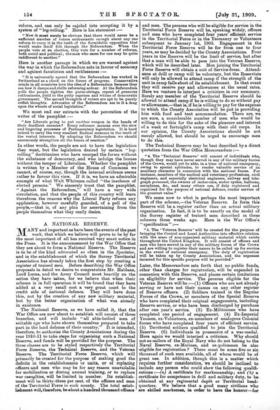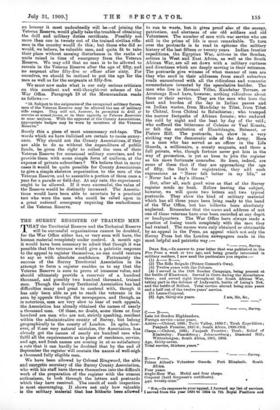A NATIONAL RESERVE.
MANY and important as have been the events of the past week, that which we believe will prove to be by far the most important of all has received very scant notice in the Press. It is the announcement by the War Office that they are about to form a National Reserve. The Reserve is to be of the kind advocated so often in the Spectator, and in the establishment of which the Surrey Territorial Association has already taken the first step by creating a register of trained men. Before describing the War Office proposals in detail we desire to congratulate Mr. Haldane, Lord Lucas, and the Army Council most heartily on the action they have taken, for we believe that when their scheme is in full operation it will be found that they have added at a very small cost a very great asset to the credit side of national defence. They will have done this, not by the creation of any new military material, but by the better organisation of what was already in existence.
The National Reserve, as we have called it, that the War Office are now about to establish will consist of three branches, and will include " all able-bodied men of suitable age who have shown themselves prepared to take part in the laud defence of their country." It is intended, therefore, to authorise the County Associations during the year 1910-11 to take steps for organising such a National 'Reserve, and funds will be provided for the purpose. The three classes are to be styled respectively the Territorial Force Reserve, the Technical Reserve, and the Veteran Reserve. The Territorial Force Reserve, which will primarily be created for the purpose of making good the deficits in the establishments or units, or of replacing officers and men who may be for any reason unavailable for mobilisation or during annual training, or to replace war casualties, will be limited in number. Its establish- ment will be thirty-three per cent. of the officers and men of the Territorial Force in each county. The total estab- lishment will, therefore, be about a hundred thousand officers and men. The persons who will be eligible for service in the Territorial Force Reserve will be, speaking widely, officers and men who have completed four years' efficient service in the Territorial Force or in the Yeomanry or Volunteers subsequent to January 1st, 1905. Engagement in the Territorial Force Reserve will be for from one to four years, as may be decided by the County Associations. Four years in the Reserve will be the limit of service, but after that a man will be able to pass into the Veteran Reserve, which will be described later. Men joining the Territorial Force Reserve will obtain a suit of Service dress. Attend- ance at drill or camp will be voluntary, but the Reservists will only be allowed to attend camp if the strength of the unit in camp falls short of its establishment. In that event they will receive pay and allowances at the usual rates. Here we venture to interject a criticism in our summary. Surely any member of the Territorial Reserve should be allowed to attend camp if he is willing to do so without pay or allowances,—that is, if he is willing to pay for the expense to which the County Association will be put in providing him with food and tent accommodation. There are, we are sure, a considerable number of men who would be willing to do this for the sake of the pleasure and interest of a week or fortnight's camp with their old corps. In our opinion, the County Associations should be not merely allowed, but should be urged to encourage men to do this.
The Technical Reserve may be best described by a direct quotation from the War Office Memorandum :— " 4. The 'Technical Reserve' will consist of individuals who, though they may have never served in any of the military forces of the Crown, would yet be able, in a time of national emergency, owing to special aptitudes, to render valuable service of an auxiliary character in connexion with the national forces. For instance, members of the medical and veterinary professions, civil engineers, and especially electrical engineers, railway and tele- graph personnel, the owners of motor-cars, motor cycles, balloons, aeroplanes, &c., and many others can, if duly registered and organised for the purpose of national defence, render service of the greatest value."
We come now to what is perhaps the most important part of the scheme,—the Veteran Reserve. In form this Reserve will be a register rather than an actual military organisation. In fact, it is to be exactly on the model of the Surrey register of trained men described in these columns three weeks ago. Here is the War Office's " specification "
"5. The 'Veteran Reserve' will be created for the purpose of bringing the Central and Local Authorities into effective relation with the mass of non-organised military material which exists throughout the United Kingdom. It will consist of officers and men who have served in any of the military forces of the Crown and are willing to register their names to be called up for service in the event of national emergency. The duty of registration will be taken up by County Associations, and the expenses incurred for this specific purpose will be provided."
Later, the Memorandum sets forth that no public funds, other than charges for registration, will be expended in connexion with this Reserve, and places certain limitations on eligibility for service. The persons eligible for the Veteran Reserve will be :—(1) Officers who are not already serving or have not their names on any other register of Reserve officers. (2) Soldiers trained in the Regular Forces of the Crown, or members of the Special Reserve who have completed their original engagements, including Reserve service, or who have been discharged by purchase after one year's service. (3) Ex-Militiamen who have completed one period of engagement. (4) Ex-Imperial Yeomen, ex-Volunteers, ex-members of analogous Colonial forces who have completed four years of efficient service. (5) Territorial soldiers qualified to join the Territorial Reserve. (6) Individuals in possession of a war-medal. Here again we would interject a criticism. Why should not ex-sailors of the Royal Navy who do not belong to the Naval Reserve, ex-Marines, and ex-policemen be also eligible for registration ? There must be some five or six thousand of such men available, all of whom would be of great use. In addition, though this is a matter which requires further consideration, we should be inclined to include any person who could show the following qualifi- cations :(a) A certificate for marksmanship; and (b) a, certificate for competence in drill and military duty, to be obtained at any regimental depot or Territorial head- quarters. We believe that a good many civilians who are skilled marksmen, in order to have the honour—for
an honour it most undoubtedly will be—of joining the Veteran Reserve, would gladly take the trouble of obtaining the drill and military duties certificate. Possibly not more than one in twenty out of the trained civilian rifle- men in the country would do this; but those who did so would, we believe, be valuable men, and quite fit to take their place without causing disturbance in the ranks of units raised in time of emergency from the Veteran Reserve. We may add that no man is to be allowed to remain in the Veteran Reserve after the age of fifty, and no sergeant after fifty-five or officer after sixty. For ourselves, we should be inclined to put the age for the men as well as for the sergeants at fifty-five.
We must now make what is our only serious criticism on this excellent and well-thought-out scheme of the War Office. Paragraph 19 of the Memorandum reads as follows :-
"19. Subject to the exigencies of the recognised military forces, men of the Veteran Reserve may be allowed the use of military rifle ranges. They will not, however, be permitted to drill or exercise as armed forces, or in their capacity as Veteran Reservists to wear uniform. With the approval of the County Associations, appropriate badges may be worn by members of the Veteran Reserve."
Surely this a piece of most unnecessary red-tape. The words which we have italicised are certain to cause annoy- ance. Why should not the County Associations, if they are able to do so without the expenditure of public funds, be given the right to collect the men of their Veteran Reserve for occasional military exercises, and to provide them with some simple form of uniform, at the expense of private subscribers ? We believe that in many cases it would be quite possible for County Associations to give a simple skeleton organisation to the men of the Veteran Reserve, and to assemble a portion of them once a year for a parade or field-day. At any rate, the experiment ought to be allowed. If it were successful, the value of the Reserve would be distinctly increased. The Associa- tions would have been able to ascertain by a practical test who were the men who could be relied upon in a great national emergency requiring the embodiment of the Veteran Reserve.







































 Previous page
Previous page